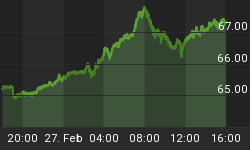In case you missed yesterday's comment (it came out quite late), a link is here. It was both lengthier and pithier than today's offering.
On Tuesday there was a very mild disappointment from Retail Sales, which clocked in at +0.3% on the aggregate and ex-autos number along with a downward revision to the prior months. Economists blamed the weather, which is probably right...but it is interesting that no one jumped to blame the weather when Initial Claims surprised on the strong side last week. And I am not sure how the weather can explain the downward revision to December. On the other hand, the Empire Manufacturing number was on-target, so nothing in today's reports should be considered a show-stopper.
And that includes the UK CPI release, which put headline inflation in the UK at 4.0% year/year. This produced lots of anguished cries for monetary tightening, but core inflation is only at 3.0%. Yes, 3% is much higher than the BOE's target, but it has been in that range since early last year. To be sure, the BOE doesn't want inflation that high, but the money supply (M4) is already contracting in Britain (two years ago it was +17.5%), and with unemployment around 8% there it seems unlikely that the BOE is about to get aggressively hawkish. The money supply contraction already means relative disinflation is in store for late 2011 or in 2012. Our quant model has a serious underweight in inflation-linked Gilts, which makes sense since the 10y UK II Gilt yield at 0.85% doesn't give a lot of protection against the declining relative inflation implied by the tight monetary conditions.
I keep saying "relative" inflation there, however, because we must always remember that liquidity is fungible. Banks and companies can borrow in a rainbow of currencies in the global capital markets. If the Fed and the BOJ add enough liquidity, then prices in general will rise although currencies of countries with more-prudent monetary policies will be more likely to appreciate and help to keep inflation in those countries comparatively lower.
The UK merits a comment today because so little seems to be happening domestically. Obama's budget will cause an ugly battle but doesn't affect the day-to-day ebb and flow of the market. Indeed, not much seems to be affecting the daily ebb-and-flow. Today marked the 10th consecutive trading day in which NYSE volumes have not reached 1 billion shares. That happened only once all of last year, and not at all in 2005, 2006, 2007, and 2008. Year-to-date NYSE volumes are down 15% over the same period last year, and -36% compared to the average of the last five years. Perhaps the stock market continues to rally because "fumes" are lighter than air.
The problem with many kinds of fumes is that they ignite easily. While there seems to be no catalyst to send equity prices sharply lower, the diminished volumes suggest that there are not a lot of buyers committed to these higher prices. The real test will be when a good break comes and we find out if volumes are light because everyone missed it and is waiting desperately for lower prices to get in, or because no one trusts these levels or the market as a whole and investors will remain on the sideline cheering when prices decline. To me, the fact that higher prices do not seem to be resulting in swelling volumes suggests the latter is more likely. But for a test, we will need an ignition source and I see nothing immediately obvious.
It need not be immediately obvious, of course! The impact will be greater if it comes as a surprise, either because no one saw the particular event coming or because no one thought it would be significant. For example, something as innocuous as a 4% 10y note rate could in principle trigger a movement into bonds from stocks in asset allocation models. It would certainly be surprising if that was a big event. No one is looking for a jump in CPI, and a bad surprise there may serve as a catalyst no one was worried about. Obviously, I don't know. I'm curious about what the readers of this article think are the most-serious potential catalysts for an equity correction.
Bonds probably don't need much of a catalyst to keep going down. Weak data and Fed buying may keep them treading water, but tomorrow's Housing Starts data (Consensus: 540k) is unlikely to trigger a rally even if weak - this is January data and it would be a bit surprising if it didn't show signs of weakness. Besides, we already know housing is weak. PPI (Consensus: +0.8%, +0.2% ex-food-and-energy) isn't a candidate because, after all, it's PPI. Industrial Production and Capacity Utilization (Consensus: +0.5%/76.3%)? No one really worries about these series when they are at middling levels. And, while FOMC minutes from the January meeting will be released tomorrow, there isn't going to be a surprise there.
No, the better chance is for Thursday's CPI release. I expect we'll have another day of fumes on Wednesday.















